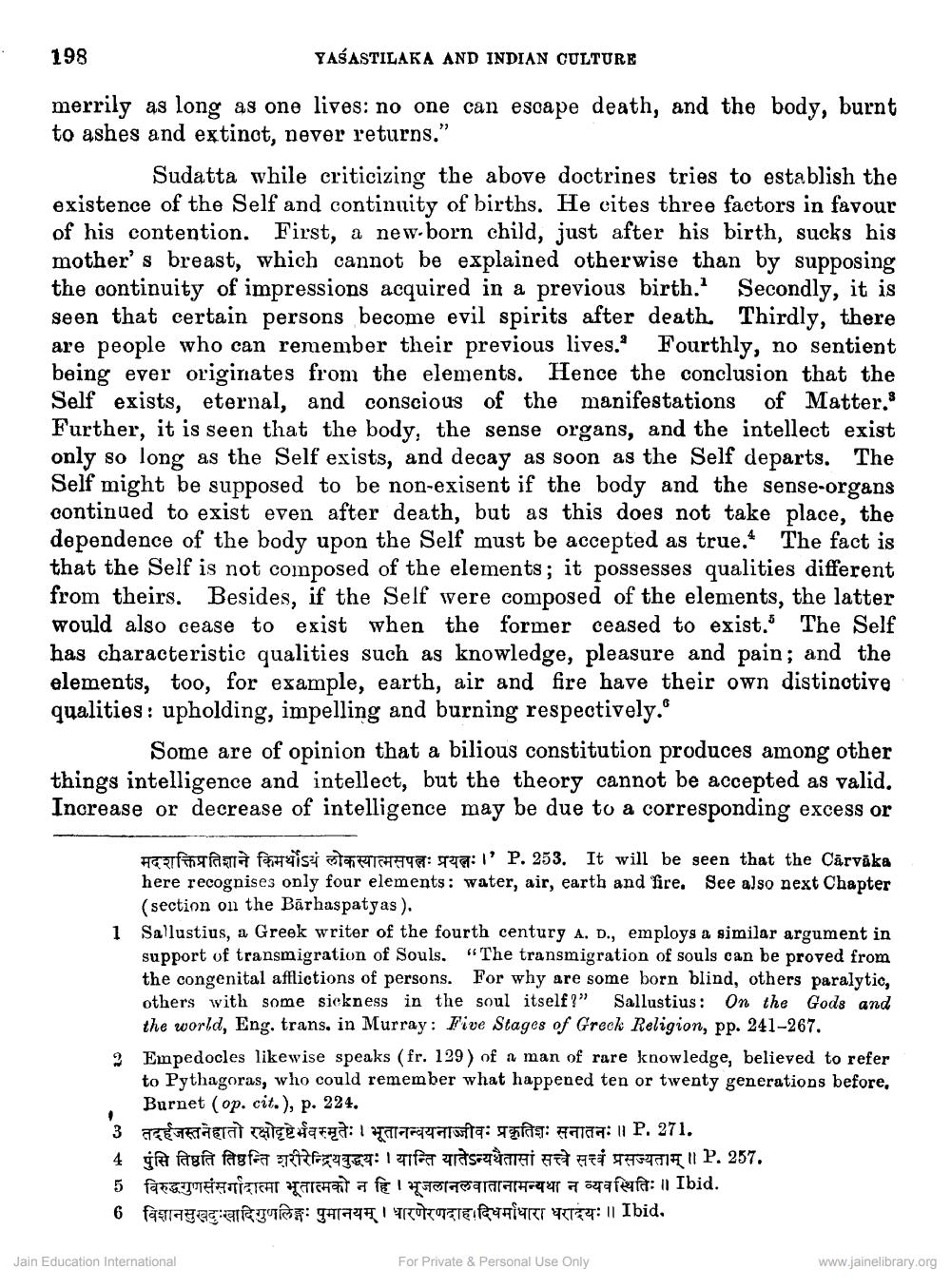________________
YASASTILAKA AND INDIAN CULTURE
merrily as long as one lives: no one can escape death, and the body, burnt to ashes and extinct, never returns."
198
Sudatta while criticizing the above doctrines tries to establish the existence of the Self and continuity of births. He cites three factors in favour of his contention. First, a new-born child, just after his birth, sucks his mother's breast, which cannot be explained otherwise than by supposing the continuity of impressions acquired in a previous birth.' Secondly, it is seen that certain persons become evil spirits after death. Thirdly, there are people who can remember their previous lives. Fourthly, no sentient being ever originates from the elements. Hence the conclusion that the Self exists, eternal, and conscious of the manifestations of Matter. Further, it is seen that the body, the sense organs, and the intellect exist only so long as the Self exists, and decay as soon as the Self departs. The Self might be supposed to be non-exisent if the body and the sense-organs continued to exist even after death, but as this does not take place, the dependence of the body upon the Self must be accepted as true.* The fact is that the Self is not composed of the elements; it possesses qualities different from theirs. Besides, if the Self were composed of the elements, the latter would also cease to exist when the former ceased to exist." The Self has characteristic qualities such as knowledge, pleasure and pain; and the elements, too, for example, earth, air and fire have their own distinctive qualities: upholding, impelling and burning respectively."
Some are of opinion that a bilious constitution produces among other things intelligence and intellect, but the theory cannot be accepted as valid. Increase or decrease of intelligence may be due to a corresponding excess or
मदशक्तिप्रतिज्ञाने किमर्थोऽयं लोकस्यात्मसपत्नः प्रयत्नः । ' P. 253. It will be seen that the Carvāka here recognises only four elements: water, air, earth and fire. See also next Chapter (section on the Barhaspatyas).
1 Sallustius, a Greek writer of the fourth century A. D., employs a similar argument in support of transmigration of Souls. "The transmigration of souls can be proved from the congenital afflictions of persons. For why are some born blind, others paralytic, others with some sickness in the soul itself?" Sallustius: On the Gods and the world, Eng. trans. in Murray: Five Stages of Greek Religion, pp. 241-267.
2 Empedocles likewise speaks (fr. 129) of a man of rare knowledge, believed to refer to Pythagoras, who could remember what happened ten or twenty generations before, Burnet (op. cit.), p. 224.
•
3 तदर्हजस्त ने हातो रक्षोदृष्टेर्भवस्मृतेः । भूतानन्वयनाज्जीवः प्रकृतिज्ञः सनातनः ॥ P. 271.
4 पुंसि तिष्ठति तिष्ठन्ति शरीरेन्द्रियबुद्धयः । यान्ति यातेऽन्यथैतासां सत्त्वे सत्त्वं प्रसज्यताम् ॥ P. 257.
5 विरुद्ध गुणसंसर्गादात्मा भूतात्मको न हि । भूजलानलवातानामन्यथा न व्यवस्थितिः ॥ Ibid. 6 विज्ञान सुखदुःखादिगुणलिङ्गः पुमानयम् । धारणेरणदाह । दिधर्माधारा धरादयः ।। Ibid.
Jain Education International
For Private & Personal Use Only
www.jainelibrary.org




